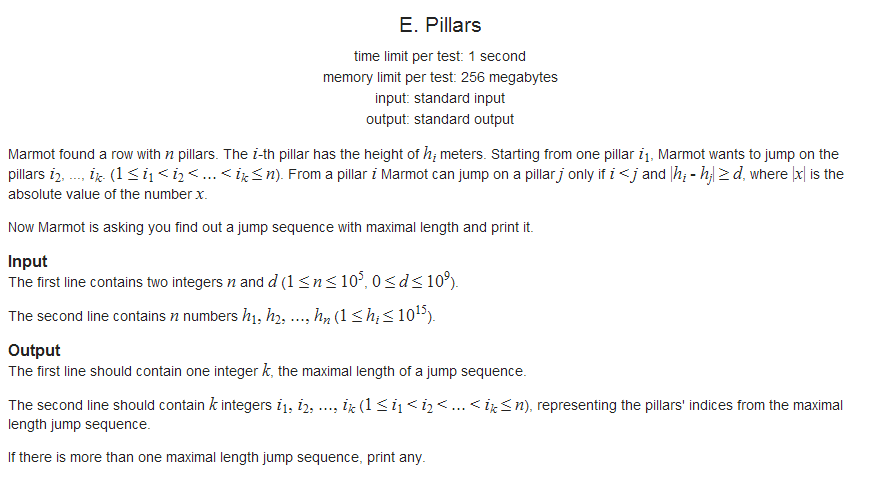CodeForces 474 E. Pillars
题意就是,给定10^5 个数(范围10^15),求最长子序列使得相邻两个数的差大于等于 d。
用 dp[ i ] 表示以 i 结尾的最长子序列的长度。则 dp[ i ] = max{ dp[ j ] }+1 ( 对所有 j < i 且 | h[i] - h[j] | >= d )
如果h数组的数据范围较小,可以直接用线段树去存。但由于 h[ i ] 最高可以达到10^15 , 所以要先将h[ i ] 离散化。
然后,用线段树去维护每个值区间的最大dp值,将 所求的值得范围对应到 离散化后的下标,要用到二分查找。
大概步骤:
1.离散化:用 map 将 long long 对应到 正自然数(转换成新的下标)。
2.初始化线段树
3.线性搜索每一个值,搜到第 i 个 的时候,用二分查找,将所求范围( | h[i] - h[j] | >= d )转换成新下标
然后用线段树求新下标的范围内的最大值,来计算 dp[ i ] 的值。然后将 dp[ i ] 加入线段树中。
4.搜索以每一个数结尾的dp值,找最大值,并利用pre数组输出路径。
代码如下:
#include <iostream>
#include <cstdio>
#include <cmath>
#include <map>
#include <cstring>
#include <algorithm>
#include <vector>
#define maxn 100001
using namespace std;
int n,d;
//第一部分:离散化
long long h[maxn];//原序H数组
struct A{
long long h;
int i;
bool operator<(const A &B)const{return h<B.h||h==B.h&&i<B.i;}
}H[maxn];//升序H数组
map<long long,int> MP;
//第二部分:线段树
int N,Kn;
int st[maxn<<2];//符合条件的DP中的最大值
int sti[maxn<<2];//最大值的旧横坐标
void init(){
N=1;while(N <Kn+2) N <<=1;
memset(st,0,sizeof(st));
memset(sti,0,sizeof(sti));
}
int query(int L,int R,int &I){
int MAX=0;I=0;
for(int s=N+L-1,t=N+R+1;s^t^1;s>>=1,t>>=1){
if(~s&1) if(MAX <st[s^1]) MAX=st[s^1],I=sti[s^1];
if(t&1) if(MAX <st[t^1]) MAX=st[t^1],I=sti[t^1];
}
return MAX;
}
void update(int X,int C,int Oldi){
int s=X+N;
st[s]=C;sti[s]=Oldi;s>>=1;
while(s>0){
if(st[s<<1]>st[s<<1|1]) st[s]=st[s<<1],sti[s]=sti[s<<1];
else st[s]=st[s<<1|1],sti[s]=sti[s<<1|1];
s>>=1;
}
}
//第三部分:二分查找
int BS1(long long X){//找到小于等于X的最大新下标 ,找不到返回0
if(X <H[1].h) return 0;
int L,R,M;
L=1,R=Kn+1;//左闭右开
begin:
if(L+1==R) goto end;
M=(L+R)>>1;
if(H[M].h <=X) L=M;
else R=M;
goto begin;
end:
return L;
}
int BS2(long long X){//找到大于等于X的最小新下标 ,找不到返回0
if(X>H[Kn].h) return 0;
int L,R,M;
L=0,R=Kn;//左开右闭
begin:
if(L+1==R) goto end;
M=(L+R)>>1;
if(H[M].h < X) L=M;
else R=M;
goto begin;
end:
return R;
}
//第四部分:DP
int dp[maxn];//dp[i]表示以i结尾的最长符合条件的子序列长度
int pre[maxn];// dp[i]表示以i结尾的最长符合条件的子序列的前一个值的坐标
int main(void)
{
while(~scanf("%d%d",&n,&d)){
//离散化
MP.clear();
for(int i=1;i<=n;++i) scanf("%lld",&h[i]),H[i].h=h[i],H[i].i=i;
sort(H+1,H+n+1);
Kn=0;
//将 long long 映射到 自然数 (去除重复)
for(int i=1;i<=n;++i) if(!MP.count(H[i].h)) MP[H[i].h]=++Kn,H[Kn].h=H[i].h,H[Kn].i=H[i].i;
//线段树
init();
//DP
for(int i=1;i<=n;++i) dp[i]=1,pre[i]=i;
for(int i=1;i<=n;++i){
int ANS,ANS1,ANS2,D;
int D1=BS1(h[i]-d),D2=BS2(h[i]+d);
if(D1) ANS1=query(1,D1,D1); else ANS1=0;//求出取值范围 1到 h[i]-d 的dp最大值
if(D2) ANS2=query(D2,Kn,D2);else ANS2=0;// 求出取值范围 h[i]+d 以上 的dp最大值
if(ANS1 > ANS2) ANS=ANS1,D=D1;//对两个区间求最大值
else ANS=ANS2,D=D2;
if(ANS>0){
dp[i]=ANS+1;
pre[i]=D;
}
update(MP[h[i]],dp[i],i);//将本次dp结果加入线段树。
}
//搜索最大长度,并输出路径
int ANS=0,ANSN;
for(int i=1;i<=n;++i) if(dp[i]>ANS) ANS=dp[i],ANSN=i;
printf("%d\n",ANS);
vector<int> V;
while(pre[ANSN]!=ANSN){
V.push_back(ANSN);
ANSN=pre[ANSN];
}
printf("%d",ANSN);
for(int i=V.size()-1;i>=0;--i) printf(" %d",V[i]);
cout<<endl;
}
return 0;
}
